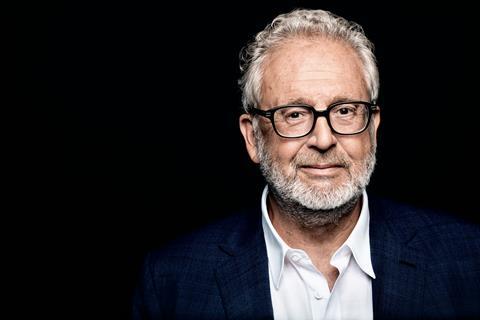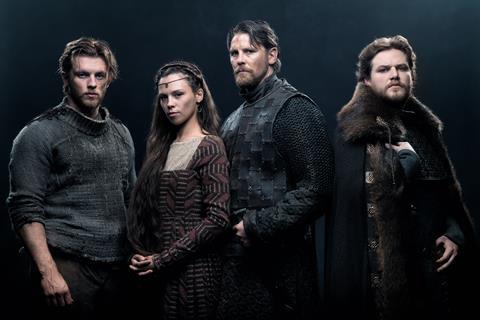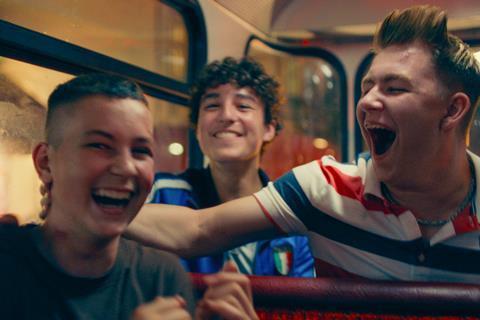
One of Germany’s leading production and distribution companies, Constantin Film is delivering one of its “most ambitious” slates of films and series this year, according to executive chairman Martin Moszkowicz.
They include Berlinale gala screening Sun And Concrete (Sonne Und Beton), directed by David Wnendt, which Constantin co-producers and distributes, and Paul W.S. Anderson’s fantasy adventure In The Lost Lands, starring Milla Jovovich and Dave Bautista. Hagen, a big budget feature and six-part series based on the epic German Nibelungen saga, has also started shooting, and Constantin is set to make a series adaptation of hit book and movie Smilla’s Sense Of Snow.
Moszkowicz, who was recruited by Constantin’s late managing director Bernd Eichinger in 1990, has headed the Munich-based company since 2014. A producer by background, Moszkowicz previously helped to build up Constantin’s Los Angeles office and has producer, executive producer and co-producer credits including Downfall, Nowhere In Africa, the Resident Evil and Fack Ju Goehte franchises, Perfume: The Story Of A Murderer and The Baader Meinhof Complex. He is also a professor at the Munich Film School, running the production department.
How much of a focus is film versus TV/streaming for Constantin?
Obviously, in the last 15 years our focus has moved from theatrical into streaming and television. This is going to continue, but we have no intention of changing our DNA – we are first and foremost a theatrical production and distribution company.
We produce between 10 and 15 theatrical movies a year, of which about 75% are German language, and the rest English language. Our distribution division handles theatrical releases across Germany, Austria, Switzerland. We also produce around 2,000 hours of television and streaming productions every year.
We shoot our movies everywhere in the world. We’ve just done two big shows in Krakow in Poland. We are shooting in Prague, Canada, Ireland, Croatia, South Africa…We’re virtually a worldwide operation in terms of production.
Why the strong focus on film, given the challenges facing the industry?
We strongly believe in a theatrical future for movies. The market is constantly changing, but the demand for theatrical movies and the in-theatre experience is still going to be there. So, we are going to make theatrical movies for the foreseeable future. However, streaming television as much as traditional TV is now a very big part of our operation. It’s growing rapidly.
And what about your focus on production versus distribution?
Most of our distribution slate – about a dozen to 15 movies every year – is produced or co-produced in house. That is one of the big differences to our competitors in Germany, who mostly acquire movies on the international market. We do acquire, but we are in the comfortable position of not having too. Acquisitions are an opportunity-driven business for us. If we find something for the right price, we happily buy a movie.
Our core business is in-house production – we finance and control everything from development through production to distribution. Constantin is a very producer-centric company. The founder of the modern version of Constantin Film, Bernd Eichinger [who died in 2011], was a producer. I’m a producer. Oliver Berben, the deputy chairman of the company who is responsible for our television and digital businesses, is a producer. We have over 50 producers within Constantin Film who are either in-house producers, or who have first-look or household deals with us.
How do you see the next few years for Constantin?
We have initiated the most ambitious production slate that we have ever had in terms of big, big movies. We believe strongly that our business is increasingly event and franchise driven. Recognisable IP and trademarks are more and more important.
So, a big part of our slate is franchise titles. We’ve been making franchises for many years, like video-game adaptations Resident Evil and Monster Hunter. We have just wrapped in Krakow on Paul W.S. Anderson’s fantasy adventure In The Lost Lands, based on a story by George R.R. Martin, starring Milla Jovovich and Dave Bautista.

We are also making a high-budget feature film and six-part series, Hagen, based on the epic German Nibelungen saga. We’ve been filming four months in Prague – shooting a huge feature film and a television series at the same time, which is a unique and new way to produce effectively. In this way, we can afford a German-language show with such a high budget.
We’re doing another big television show this year – Smilla’s Sense Of Snow – based on the Bille August-directed feature film that we made nearly 30 years ago.
We have a legacy sequel coming out in March to a German movie from the early ’90s with Til Schweiger called Manta, Manta, which has since become the most successful German movie ever on television.
What about growing the company? Are you focused on organic growth or acquisitions?
We have the same approach to growth as for acquisitions. It’s all opportunity driven. We don’t have any immediate growth targets we need to hit; we just need to be profitable. That’s our mandate from our shareholders. I am proud to say that the last 10 years have been the most profitable years in Constantin’s history.
We are very product driven. We always like to know about specific feature film or television projects. In terms of buying companies, it’s not so much our thing. But we do have a lot of subsidiaries especially within Germany. They are mainly mid-sized production companies, because we feel that, especially feature films, but also series, are developed and produced better within smaller units. If a company is too big, it becomes very, very difficult to attract the top creative people.
We have been expanding in a couple of areas though. We are partners in Matt Brodlie and Jonathan Kier’s Los Angeles-based Upgrade Productions, which is developing and producing local-language films and series for global audiences.
We have also teamed with one of our former competitors Herbert Kloiber, who used to own Tele München Group, in High End Productions to produce premium European scripted series. The first big project, which is going to start shooting in March, is Those About To Die, Roland Emmerich’s first big television series, a 10-parter set in ancient Rome. We are distributing all of Europe, so not only to Germany.

How would you characterise the German market at the moment?
In the last couple of years there has been a huge production boom all over Europe, mainly driven by the streamers. I think that is changing a little bit, they’re slowing down substantially.
The German theatrical market is not as developed as it is in countries like France. Per capita cinema-going in Germany is rather low compared to the rest of Europe. There are lots of reasons for that: many other entertainment offerings are available to audiences, with a very vivid free television landscape being one of them obviously.
But, there are approximately 100 million German-speaking people in Europe so it is a very big market. I think that production wise, there is a big future. That’s why a lot of companies have been entering the market and buying up smaller mid-sized companies.
Companies such as Leonine have led M&A in the German market. Do you think there will be more consolidation in the German industry?
I think there will be. It is just something that’s inevitable. But I don’t think Germany will be as consolidated as the entertainment markets in the UK or America, where a couple of big studios or production companies control pretty most of the market.
Germany, I would say, is a mid-sized company driven market. We have a lot of independent producers all over Germany, some of them very successful. We have a subsidy system which, despite some major flaws, is very effective and pours around €600m into the industry every year.
We also have big issues with respect to lack of crew and rising production costs, like everywhere else. But, over the next couple of years, I’m very confident that we’ll get back on track. Our industry has been constantly changing over the last 100 years. I think it’s the sign of a very sound industry if it can adapt as much as we have done.







![The Brightest SunScreen[Courtesy HKIFF]](https://d1nslcd7m2225b.cloudfront.net/Pictures/274x183/3/5/0/1448350_thebrightestsunscreencourtesyhkiff_312678.jpg)











![[Clockwise from top left:] Francois Ozon, Benjamin Voisin, Swann Arlaud, Pierre Lottin, Rebecca Marder, Denis Lavant](https://d1nslcd7m2225b.cloudfront.net/Pictures/100x67/1/0/6/1449106_thestrangerv2_631475.jpg)





No comments yet